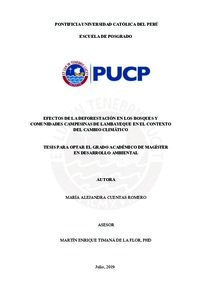| dc.contributor.advisor | Timaná de la Flor, Martín Enrique | |
| dc.contributor.author | Cuentas Romero, María Alejandra | |
| dc.date.accessioned | 2019-10-15T16:59:55Z | es_ES |
| dc.date.available | 2019-10-15T16:59:55Z | |
| dc.date.available | 2019-10-15T16:59:55Z | es_ES |
| dc.date.created | 2019 | es_ES |
| dc.date.issued | 2019-10-15 | es_ES |
| dc.identifier.uri | http://hdl.handle.net/20.500.12404/15164 | |
| dc.description.abstract | La deforestación es un problema a nivel global cuya evidencia científica no hace sino
alarmar aún más la situación de los bosques con el tiempo. Uno de los ecosistemas
forestales del Perú, con particulares características, pero a la vez de poco conocimiento
en la comunidad científica, son los bosques secos del norte. Los cambios de uso de suelo
son uno de los principales contribuyentes para la deforestación de estos bosques, y su
pérdida aportan en la intensificación de otro problema global: el cambio climático. La
investigación busca identificar y analizar los efectos de la deforestación en Lambayeque,
tanto en los cambios en estructura física y biológica de estos bosques, así como en la
relación ecosistemas-sociedad entre estos con las comunidades campesinas. Lambayeque
cuenta con distintos tipos de bosque seco (sabana, colina y montaña), por lo que el área
de estudio comprende esta diversidad de bosques secos y que están bajo categorías de
protección nacional y conservación regional: Refugio de Vida Silvestre Laquipampa,
Área de Conservación Regional Huacrupe La Calera y Santuario Histórico Bosque de
Pómac. El análisis de cambios de cobertura, fragmentación del paisaje y modelos de
distribución potencial de especies por efecto del cambio climático, muestran que la
deforestación va más allá de un proceso de devastación masiva. Internamente incluye
consecuencias que afectan a varios sectores, a pesar de no tener la magnitud de cobertura
ni de pérdida que otros ecosistemas. Además, la población local, por medio de la
percepción y conocimiento, da las bases para proponer y establecer estrategias de uso
sostenible de los recursos forestales del bosque seco. | es_ES |
| dc.description.abstract | Deforestation is a global problem whose scientific evidence only alarms the situation of
forests over time. One of the forest ecosystems of Peru, with particular characteristics,
but at the same time of little knowledge in the scientific community, are the dry forests
of the north. Changes in land use are one of the main contributors to the deforestation of
these forests, and their loss is one of the factors in the intensification of another global
problem: climate change. The research seeks to identify and analyze the effects of
deforestation in Lambayeque, both in the changes in physical and biological structure of
these forests, as well as in the ecosystem-society relationship between these with the
peasant communities. Lambayeque has different types of dry forest (savanna, hill and
mountain), so the study area includes this diversity of dry forests and that fall under
national protection and regional conservation categories: Refugio de Vida Silvestre
Laquipampa, Área de Conservación Regional Huacrupe La Calera and Santuario
Histórico Bosque de Pómac.The analysis of changes in coverage, fragmentation of the
landscape and models of potential distribution of species due to climate change, show that
deforestation goes beyond a process of massive devastation. Internally it includes
consequences that affect several sectors, despite not having the magnitude of coverage or
loss that other ecosystems. In addition, the local population, through the perception and
knowledge, provides the basis to propose and establish strategies for the sustainable use
of the forest resources of the dry forest. | es_ES |
| dc.language.iso | spa | es_ES |
| dc.publisher | Pontificia Universidad Católica del Perú | es_ES |
| dc.rights | Atribución-NoComercial-CompartirIgual 2.5 Perú | * |
| dc.rights | info:eu-repo/semantics/openAccess | es_ES |
| dc.rights.uri | http://creativecommons.org/licenses/by-nc-nd/2.5/pe/ | * |
| dc.subject | Deforestación--Perú--Lambayeque | es_ES |
| dc.subject | Cambio climático--Perú--Lambayeque | es_ES |
| dc.subject | Reservas forestales--Perú--Lambayeque | es_ES |
| dc.subject | Protección ambiental--Participación ciudadana | es_ES |
| dc.title | Efectos de la deforestación en los bosques y comunidades campesinas de Lambayeque en el contexto del cambio climático | es_ES |
| dc.type | info:eu-repo/semantics/masterThesis | es_ES |
| thesis.degree.name | Magíster en Desarrollo Ambiental | es_ES |
| thesis.degree.level | Maestría | es_ES |
| thesis.degree.grantor | Pontificia Universidad Católica del Perú. Escuela de Posgrado | es_ES |
| thesis.degree.discipline | Desarrollo Ambiental | es_ES |
| renati.advisor.dni | 25696637 | |
| renati.advisor.orcid | https://orcid.org/0000-0003-1559-4449 | es_ES |
| renati.author.dni | 46429620 | |
| renati.discipline | 521547 | es_ES |
| renati.juror | Roca Alcazar, Fernando Hector | |
| renati.juror | Timana De La Flor, Martin Enrique | |
| renati.juror | Schorr, Bettina Maria | |
| renati.level | https://purl.org/pe-repo/renati/level#maestro | es_ES |
| renati.type | http://purl.org/pe-repo/renati/type#tesis | es_ES |
| dc.date.EmbargoEnd | 2024-01-15 | |
| dc.publisher.country | PE | es_ES |
| dc.subject.ocde | https://purl.org/pe-repo/ocde/ford#1.05.08 | es_ES |






